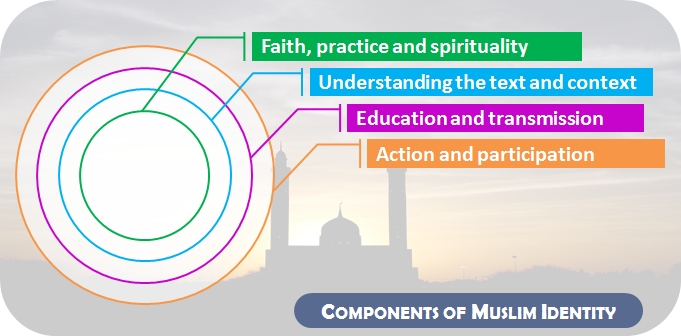These four elements give an adequate picture of the fundamentals of Muslim identity, individual and social, separate from its cultural reading in a specific region of the world. The kernel of faith, with practice and spirituality, is the light by which life and the world are perceived.
Understanding the Texts and the context allows one to order one’s mind both in relation to oneself and in relation to the environment. In a broader circle, education and transmission make it possible both to hand on the pledge as a gift and to pass on the message. And, finally, in an even broader context, action and participation are the full demonstration of this identity through the way one behaves for oneself, toward the other, and toward Creation (action) and with one’s fellow-citizens and the whole of humankind (participation).
It becomes apparent, then, that the definition of Muslim identity can be only of something open and dynamic, founded, of course, on basic principles but in constant interaction with the environment.
The diagram below, beginning with faith at the core and moving on to expression through engagement with people, participation, demonstrates fairly clearly the way we have articulated the definition of Muslim identity.

The great responsibility of Muslims in the West is to dress these four dimensions of their identity in a Western culture while staying faithful to the Islamic sources, which, with their conception of life, death, and Creation, remain the fundamental frame of reference.
Keeping in mind both the distinction between the usul (the fundamental elements of the religion) and the furu` (the secondary elements), the three levels of maslaha—that is, al-daruriyyat (the indispensable), al-hajiyyat (the necessary, the complementary), and al-tahsiniyyat (the additional enhancing, the perfecting)— as well as the areas in which ijtihad may be applied, Muslims, both `ulama and group leaders, should provide Western Muslims with appropriate teachings and regulations that will make it possible for them to protect and to actualize their Muslim identity, not as Arabs, Pakistanis, or Indians but as Westerners.
This slow process has actually been taking place for only about twenty years, and it is proceeding, making possible the birth of a new and authentic Muslim identity, neither completely dissolved in the Western environment nor reacting against it but rather resting on its own foundations according to its own Islamic sources. In the second part of this book I shall try to give concrete illustrations of these dynamics and the direction in which I believe they should move together.
Pages: 1 2 3 4